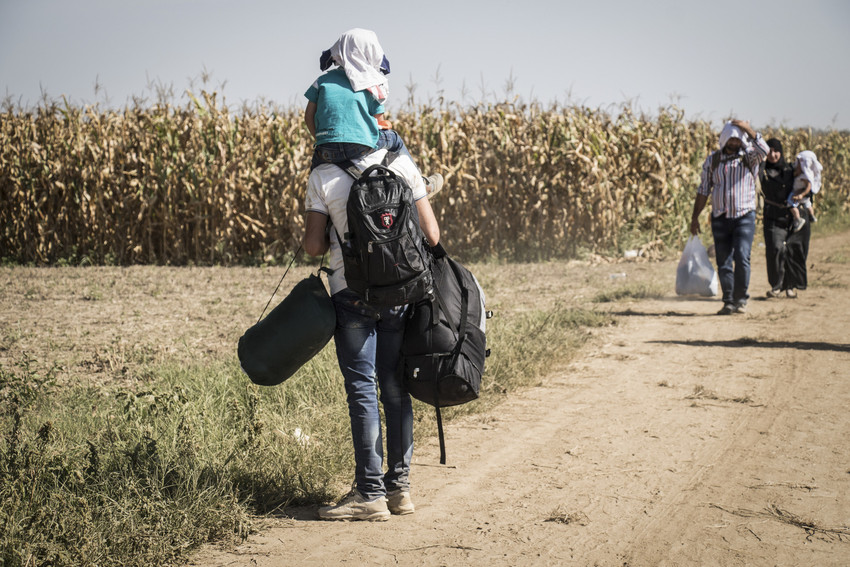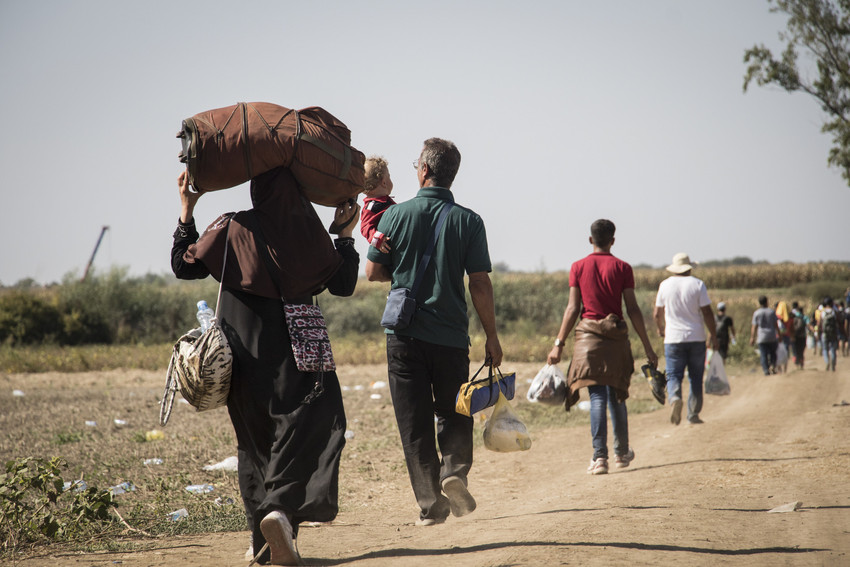 North West Balkans
North West Balkans
Languages
Refugees and migrants in Serbia: Without safe and legal routes
Op-ed from Serbia
By Stuart J. Sia

A man carrying his little boy on his shoulders, a backpack on his back, another backpack on one arm, and a bag in the other, waits for some people down the path towards Croatia. (Photo: Stuart Sia/Save the Children)
“Why do you want to talk to me? I have nothing,” she tells us.
Arms akimbo, she looks away for a moment as my translator tells me what she’s said. She’s holding back tears, but she fails, and dropping her stoic stance, she seems to crumple, elbows in, rubbing the renegade tears into her cheeks with her fingers.
I’ll call her Fida*, for the Arabic word for sacrifice. She is one of the thousands of refugees on Serbia’s border with Hungary, denied entry since last week’s midnight closure of all official crossings between the two countries. She started the journey as a mother of two, and though her travels are far from complete, she’s become the mother of one. With her city bombed, house destroyed, and the loss of her child to an unknown illness along the way, this literal roadblock and last week’s violence with the police caused her to lose hope. She declined to be recorded on tape or photographed, but after explaining what we were doing, she wanted to talk and share her story. As I rummaged through my bag to find my notebook, I looked up to see her offering us a pen and paper.
“We’ve slept on boats, we’ve slept in the mud, we’ve slept on roads,” she tells us. “The whole way, we don’t know what’s going to happen.”
The first boat they tried to take to Greece didn’t make it further than the harbor before they were forced to turn back because of a break. They waited four days before trying again. The next boat was holding 20 people, 15 of whom were children. Fortunately this last attempt was a success.
Another woman, Manal*, who was traveling with eight family members and five neighbors from Syria, took a boat from Turkey to Greece. “Our boat broke before we reached the shore, which meant we had to swim part of the way, but luckily we didn’t lose the money we had,” she says.
We know of approximately 2600 lives claimed by the Mediterranean this year, and thousands continue to risk adding their names to that growing list. Continuing search and rescue operations off the European coast is vital to saving lives, even as the EU looks to longer term solutions for those who have arrived within its borders.
I spoke with dozens of refugees and migrants in the Serbian cities of Belgrade, Horgoš (bordering Hungary) and Šid (bordering Croatia). Most of them were coming from Syria. The others came from Afghanistan, Bangladesh, Iraq, Pakistan, Sudan, and other countries. Escaping war and conflict, some were weary of strangers but opened up to share their stories anyway. With temperatures in the high 90s Fahrenheit this past week, dehydration was a big problem, and I even saw a woman at the Hungarian border rushed to an ambulance after she passed out from the heat. Our team went to the Serbia-Hungary border crossing at Horgoš-Röszke to collect people’s stories and assess needs, but anticipating the likely consequences of a very hot day, we ended up procuring bottled water and biscuits to distribute along the way. There were around 200 when we arrived that morning, but that swelled to 500 by the late afternoon, and to more than 2000 by the next day. When asked what they needed, most people I spoke with emphasized safe passage through Hungary. In these conversations, we were often mere feet if not inches from Hungarian soil, and it almost seemed cruel for them to have traveled so far only to have their progress halted with no clear alternatives ahead.

Turhan*, his wife and baby Iqbal* on their way to the Croatian border. We met Turhan*, his wife and baby boy the day before at Save the Children's Mother and Baby corner at the Asylum Information centre in Belgrade. When Turhan* saw Save the Children's staff again, he greeted them with "Marhaba!". (Photo: Stuart Sia/Save the Children)
Manal* and her group of 13 from Syria, arrived in Horgoš last Wednesday. “We were trampled during the push at the border, when the Hungarian police started firing water cannons and tear gas,” she says, her voice shaking. “I had to pick up my nephew and run with him during the scramble.” She fell to the ground, but continued holding him close to protect him as people stepped on her. “When the police tried to arrest me, I thought I would die.”
“At that moment, I wish I had never left Syria. At least then, I would be in my own country.”
Without safe and legal routes into Europe, the desperate thousands of refugees and migrants are compelled to take great risks. The risks are greater still for children, many of whom have already suffered the loss of their homes and communities, witnessed violence, and embarked on a journey where they are vulnerable to hunger and sickness.
For Fida*, with her son gone and the future for her surviving daughter uncertain, hope has worn thin.
“This isn’t life,” she says, “Where will we go? Again, just moving from place to place.”